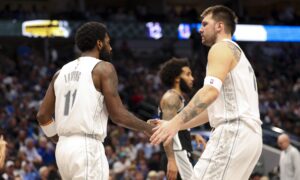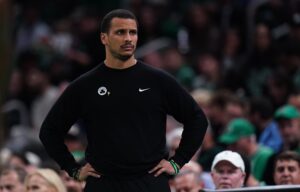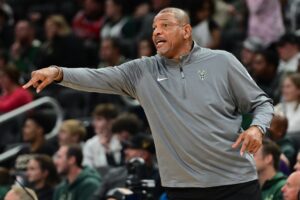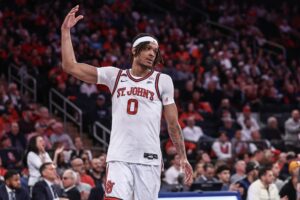The NBA and its Players’ Association recently came to an agreement on a new Collective Bargaining Agreement (CBA). Though the full agreement has not resulted in an ironclad contract just yet, both parties have agreed in principle. There is a blueprint moving forward. This new deal is expected to last through the 2023-24 season, with an opt out option following the penultimate year. For the next seven years, labor peace will reign in the association.
NBA CBA Completed: Labor Peace Reigns in the Association
On Wednesday December 14th, the NBA and the Players’ Association struck an agreement, pending ratification. The NBA then released another statement saying that they had, in fact, ratified the new agreement.
The CBA has officially been ratified: pic.twitter.com/1FpzZol6nL
— Jeremy Woo (@JeremyWoo) December 23, 2016
In a previous article, the team at Last Word On Pro Basketball covered the revelation of the agreement. This article seeks to examine proposed highlights and changes to previous agreements.
Preventing the Composition of Super-teams
Since 2010, there has been a consistent exodus of players leaving their incumbent “smaller market” teams to join forces with other stars, forming ‘super-teams’. LeBron James left the Cleveland Cavaliers. James joined the Miami Heat, along with Chris Bosh, to play with Dwyane Wade. Amare Stoudemire made a similar move, leaving the Phoenix Suns to join the New York Knicks.
Perennial All-Stars like Chris Paul, Carmelo Anthony, Dwight Howard, and Kevin Love all engineered trades to destinations of their choosing. This effectively meant that players were becoming more aware of their strengths, in terms of possible choices of teammates and organizations. The proposal of a “Designated Veteran Player Exception” is offered as an alternative.
Through the off-season moves of 2016, it was evident that money – or lack thereof – was not an issue. Players moved from team to team without fear of lost earnings. Superstar Kevin Durant’s departure from the Oklahoma City Thunder was in part because the Thunder could not match the Golden State Warriors’ offer on a short-term contract. The Thunder, by rule, could have offered Durant only 107 percent of his current salary. This amounted to $21 million in the first year of the 2016 deal, whereas Golden State could offer him north of $25 million.
One may ask why Durant was only interested in a short-term deal. The answer is that Durant was about to enter his tenth season in the NBA. A veteran of ten years has the ability to sign the most lucrative contract that a team can offer under the then-CBA. This was a financial move as well as a basketball move for Durant. Great for Durant, great for the Warriors, but disastrous for the Thunder.
To combat this issue, the league and players proposed an incentive structure for the upper-echelon players. According to Brian Windhorst of ESPN, the new max-level contract will be different in how teams can offer it. In other words, the incumbent team now has a huge monetary advantage to aid in retaining the top talent. Professional basketball is a business conglomeration, and the players are individual businesses. Bearing that in mind, please note that the primary goal of any business is to maximize profit. If the disparity in salary offers is so vast, then, more often than not, the players will stay with their home teams.
Windhorst illustrated the case of Stephen Curry, who is going to enter free agency after this season. All 30 teams in the league would love to be able to acquire the two-time league MVP. However, under this new proposal, the Warriors can offer Curry approximately $76 million more than other teams over the five-year period. Curry may be a humble man, but will he turn down that much money? It’s not very likely.
Other stars in line for the Designated Veteran Player Exception include Paul George, Blake Griffin, and DeMarcus Cousins.
Amendment to Salary Extension Rule
Under the present CBA, teams are allowed to offer a maximum increase of 7.5 percent for the first year of the extension – similar to the case of OKC and Durant. With this new agreement, a new rule is put in place. This will allow an increase to move to 120 percent of the last year of the player’s contract. The new rule is catered to players who signed their extensions prior to last off-season’s money grab.
Adjusted Salaries
According to The Vertical‘s Bobby Marks, current players with multiple year minimum contracts will receive the adjusted salary increases beginning in July 2017. This is significant, as this increase will count against their team’s salary cap number and impact cap space.
Also of note, players who signed a three-year deal under the current CBA were unable to negotiate an extension. Players will now enter negotiations with their teams following the second anniversary of the current contract.
Special Provisions for Russell Westbrook and James Harden
Superstars and MVP candidates Russell Westbrook and James Harden are in line for huge contract offers from their respective teams this off-season. Both players signed multi-year extensions during the past off-season. These proposed new deals place Harden and Westbrook in line to make roughly $36 million annually over five years. The special provision is an amendment to the Designated Veteran Player Exception mentioned earlier.
Sources on @TheVertical: New CBA will allow Russell Westbrook and James Harden to sign super-max extensions in 2017. https://t.co/29Zb0QHcNh
— Adrian Wojnarowski (@wojespn) December 21, 2016
The Vertical’s Adrian Wojnarowski mentioned another nugget:
“The NBA’s 36-and-over rule that prohibits players from signing a five-year maximum contract if their 36th birthday falls during the life of the deal has changed to a 38-and-under rule, league sources said. Several members of the union’s executive committee, including president Chris Paul, vice president LeBron James, and executive committee member Carmelo Anthony could benefit financially from the rule. Under this change, Paul, a perennial All-Star, is eligible for a five-year, $207 million deal to stay with Los Angeles this summer.”
The percentage of Basketball Related Income (BRI) distributed to the players will remain the same as the current CBA. However, the players have negotiated to extend the definition of BRI. Therefore, they successfully lobbied to increase the size of the proverbial pie. In turn, this increases the total dollar amount of revenue the players will receive, though not the percentage of it.
NBA, NBPA continue discussing group licensing issue to complete the CBA deal. "Still working at it, still close," a source in talks says.
— Adrian Wojnarowski (@wojespn) December 13, 2016
It is often said that ‘money cannot purchase happiness’. That may very well be true. However, money can purchase contentment and comfort. This new deal appears to be a compromise for both players and owners alike, although the owners may have lost some ground.
Main Photo:






